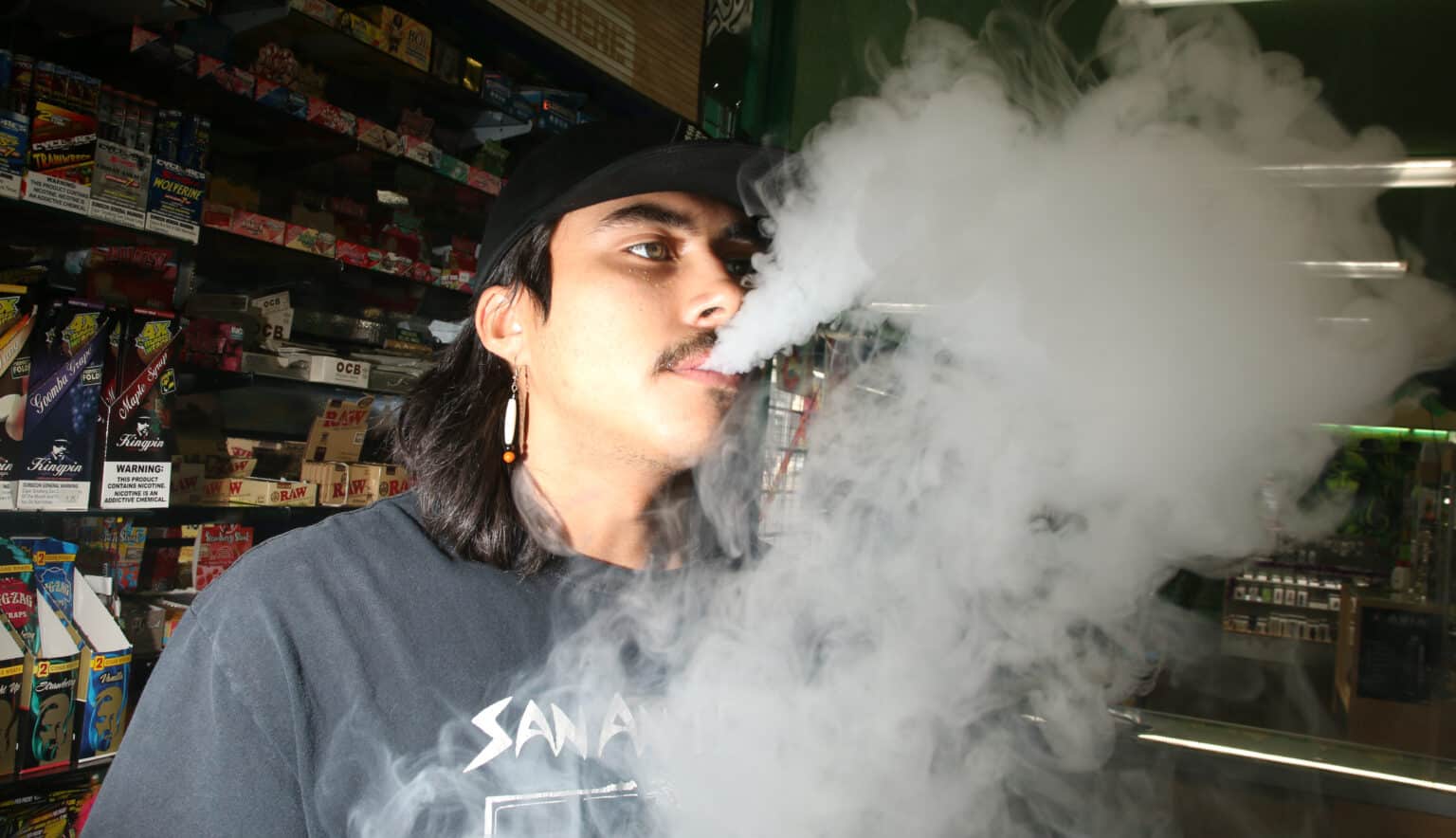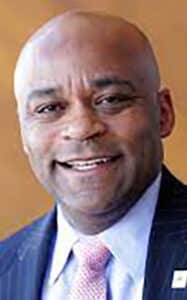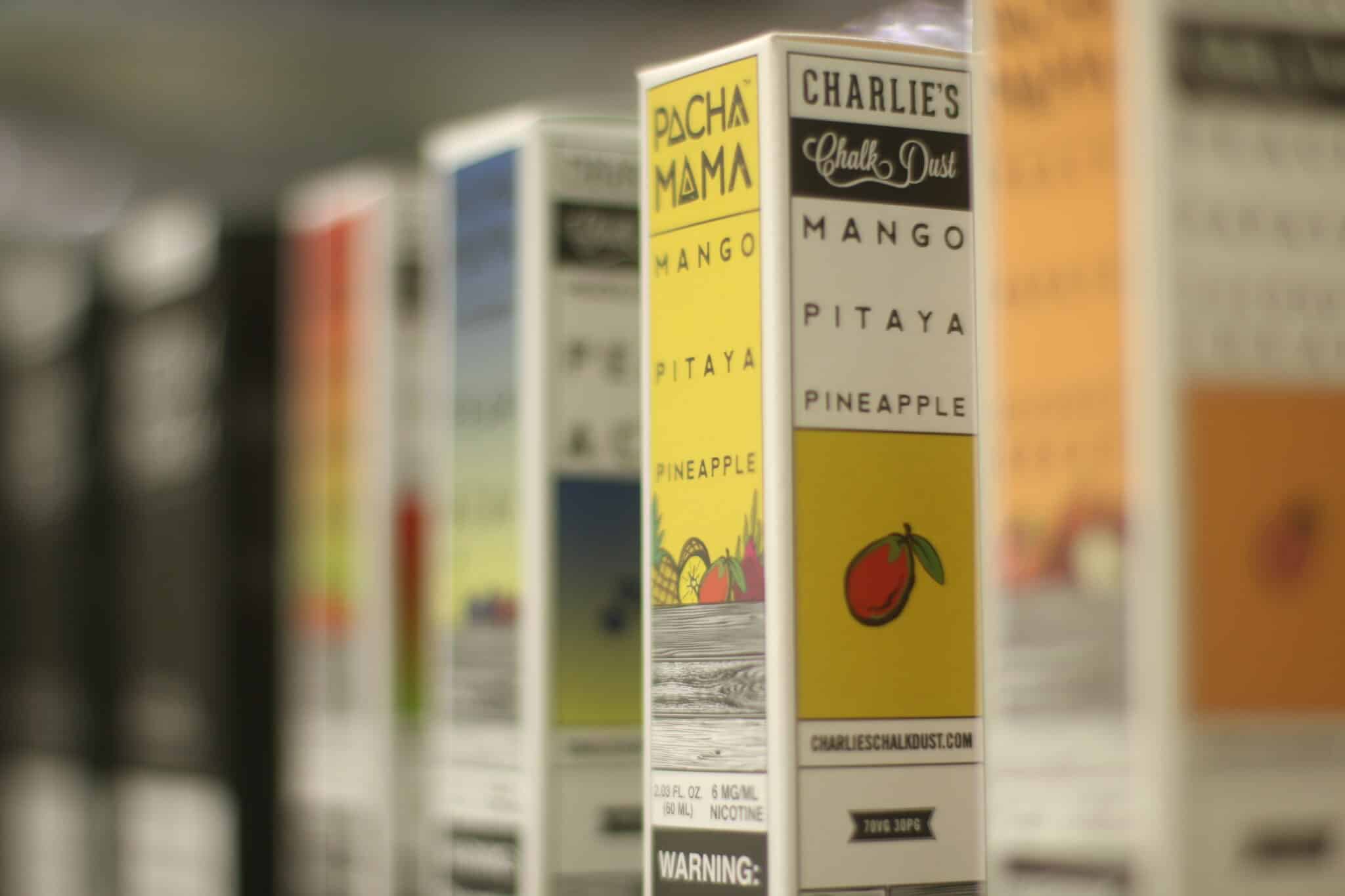
Luciano Neel, an assistant manager at Myxed Up Creations at the corner of Ivy Street and East Colfax Avenue, blows a vapor cloud. (BusinessDen file)
Denver Mayor Michael Hancock on Friday vetoed a measure passed by the City Council that would have banned the sale of certain flavored nicotine and tobacco products starting in July 2023.
In response, the two councilwomen who spearheaded the measure said they will ask their colleagues to override the veto at Monday’s meeting.
Hancock said the bill to curtail youth vaping and smoking was “well-intentioned,” but ineffective if they are still sold in neighboring cities.
He said a ban should be done through the state legislature or at least in tandem with the region’s cities, most of which do not have a similar ban.
The mayor also said many Denver retailers depend on the income from the products and he didn’t want to cripple them while helping similar businesses in other cities thrive.
“I share with the sponsors of this ordinance the desire and goal to reduce youth nicotine use in our city, especially youth vaping, which has become increasingly prevalent,” Hancock wrote in a letter to the council. “We all recognize the public health challenge that flavored tobacco products pose for our city, families and communities, and as a city government we have taken steps to address that challenge.”
The Friday veto was only the second for Hancock, who was sworn in as mayor in July 2011. In February 2020, he vetoed a bill that would have ended the city’s ban on owning pit bulls; nine months later, the city’s voters overturned the ban themselves at the ballot box.
As BusinessDen previously reported, the tobacco bill would have banned sale of flavored products that have not been approved by the U.S. Food and Drug Administration to help people quit smoking. That includes certain flavored cigars, vaping products and chewing tobacco.
The council had considered certain exemptions to the ban, with flavored tobacco for hookahs and “premium” cigars being the only ones the council eventually approved.
Hancock noted that Denver has already taken steps to reduce youth nicotine use, citing raising the minimum age to purchase tobacco products to 21, instituting a new tobacco retail license and enhancing enforcement efforts.
The mayor said he wants to continue discussions with the council about possible additional efforts.
Councilwomen Amanda Sawyer and Deborah Ortega, who introduced the bill, filed a proposal Friday seeking to overturn the veto during Monday’s City Council meeting.
“We are disappointed in this outcome, but we don’t think anyone in Denver will be surprised to hear that our mayor chose profit over people,” Sawyer and Ortega said in a joint statement Friday. “Make no mistake, this is (a) public health issue. Departments and agencies make enforcement rules in their policies and procedures, and they work for the mayor, not council.”
The councilwomen said if Hancock believes increasing enforcement will be effective in stopping businesses from violating the law, he would have already directed the city to do so.
“So far, he has chosen not to do anything, but we appreciate his partnership in continuing this discussion,” Sawyer and Ortega said. “That said, this veto is part of the legislative process, and we look forward to another council vote on Monday night.”
Nine of the 13 council members must vote in favor of overriding the veto, according to the Denver city charter. The vote to approve the ban was 8-3, with council members Chris Herndon and Kevin Flynn absent.
Phil Guerin, the owner of Myxed Up Creations vape shop at the corner of Ivy Street and West Colfax Avenue, said he was “relieved” that the mayor vetoed the bill. But he said he knows the fight to maintain his right to sell flavored nicotine and tobacco products is not over.
“I’m most relieved for us as adults that our rights don’t get trampled,” Guerin told BusinessDen on Friday. “I’m glad the process is working out. Obviously, the vote to pass the bill was devastating. But on Monday the City Council can override the mayor’s veto, so we’re just hoping people will see things the way the mayor sees them.”
Guerin spoke at multiple council hearings throughout the process, saying that the ban on most flavored tobacco and nicotine products would have caused his business to close.
“I don’t think that (the veto) is a lock, but I think that it looks good,” he said.

Luciano Neel, an assistant manager at Myxed Up Creations at the corner of Ivy Street and East Colfax Avenue, blows a vapor cloud. (BusinessDen file)
Denver Mayor Michael Hancock on Friday vetoed a measure passed by the City Council that would have banned the sale of certain flavored nicotine and tobacco products starting in July 2023.
In response, the two councilwomen who spearheaded the measure said they will ask their colleagues to override the veto at Monday’s meeting.
Hancock said the bill to curtail youth vaping and smoking was “well-intentioned,” but ineffective if they are still sold in neighboring cities.
He said a ban should be done through the state legislature or at least in tandem with the region’s cities, most of which do not have a similar ban.
The mayor also said many Denver retailers depend on the income from the products and he didn’t want to cripple them while helping similar businesses in other cities thrive.
“I share with the sponsors of this ordinance the desire and goal to reduce youth nicotine use in our city, especially youth vaping, which has become increasingly prevalent,” Hancock wrote in a letter to the council. “We all recognize the public health challenge that flavored tobacco products pose for our city, families and communities, and as a city government we have taken steps to address that challenge.”
The Friday veto was only the second for Hancock, who was sworn in as mayor in July 2011. In February 2020, he vetoed a bill that would have ended the city’s ban on owning pit bulls; nine months later, the city’s voters overturned the ban themselves at the ballot box.
As BusinessDen previously reported, the tobacco bill would have banned sale of flavored products that have not been approved by the U.S. Food and Drug Administration to help people quit smoking. That includes certain flavored cigars, vaping products and chewing tobacco.
The council had considered certain exemptions to the ban, with flavored tobacco for hookahs and “premium” cigars being the only ones the council eventually approved.
Hancock noted that Denver has already taken steps to reduce youth nicotine use, citing raising the minimum age to purchase tobacco products to 21, instituting a new tobacco retail license and enhancing enforcement efforts.
The mayor said he wants to continue discussions with the council about possible additional efforts.
Councilwomen Amanda Sawyer and Deborah Ortega, who introduced the bill, filed a proposal Friday seeking to overturn the veto during Monday’s City Council meeting.
“We are disappointed in this outcome, but we don’t think anyone in Denver will be surprised to hear that our mayor chose profit over people,” Sawyer and Ortega said in a joint statement Friday. “Make no mistake, this is (a) public health issue. Departments and agencies make enforcement rules in their policies and procedures, and they work for the mayor, not council.”
The councilwomen said if Hancock believes increasing enforcement will be effective in stopping businesses from violating the law, he would have already directed the city to do so.
“So far, he has chosen not to do anything, but we appreciate his partnership in continuing this discussion,” Sawyer and Ortega said. “That said, this veto is part of the legislative process, and we look forward to another council vote on Monday night.”
Nine of the 13 council members must vote in favor of overriding the veto, according to the Denver city charter. The vote to approve the ban was 8-3, with council members Chris Herndon and Kevin Flynn absent.
Phil Guerin, the owner of Myxed Up Creations vape shop at the corner of Ivy Street and West Colfax Avenue, said he was “relieved” that the mayor vetoed the bill. But he said he knows the fight to maintain his right to sell flavored nicotine and tobacco products is not over.
“I’m most relieved for us as adults that our rights don’t get trampled,” Guerin told BusinessDen on Friday. “I’m glad the process is working out. Obviously, the vote to pass the bill was devastating. But on Monday the City Council can override the mayor’s veto, so we’re just hoping people will see things the way the mayor sees them.”
Guerin spoke at multiple council hearings throughout the process, saying that the ban on most flavored tobacco and nicotine products would have caused his business to close.
“I don’t think that (the veto) is a lock, but I think that it looks good,” he said.


